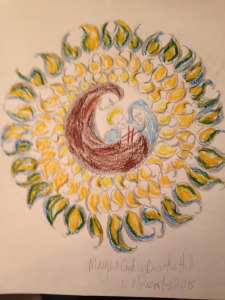I summon today
All these powers between me and those evils,
Against every cruel and merciless power
that may oppose my body and soul
,
Against incantations of false prophets,
Against black laws of pagandom,
Against false laws of heretics,
Against craft of idolatry,
Against spells of witches and smiths and wizards,
Against every knowledge that corrupts man’s body and soul;
Christ to shield me today
Against poison, against burning,
Against drowning, against wounding,
So that there may come to me an abundance of reward.
As a young reader I loved fantasy books. The epic tales featured noble and brave young people who were enmeshed in the battle between Good and Evil: The Lion, The Witch and the Wardrobe, The Lord of the Rings, and Star Wars. Though the battles were difficult, they were always so clear which side was right and which was wrong. And God, the Force, the Truth, was always with the hero.
As an adult I gradually learned that things weren’t so clear and that evil often arises out of good intentions or understandable fears and sometimes from the history and present of our beloved Christian church.
To summon protection from evil as we pray this section of the St. Patrick’s prayer seems to be a much more difficult task. I look at the war in Syria that drags on and on and on. I see evil in the indiscriminate bombing of civilians and leaving people to starve in villages laid seige. But is evil also in the people traffickers who lead refugees to die in rickety boats and washed up on Greek beaches? Is evil to be found in countries refusing to take in refugees or those who refuse to help fund the cost for their care? How do I pray for protection from this?
If I choose to live in the world, to really listen and learn and live an examined life, I open myself up to truly seeing evil that may oppose my body and soul. And equally, to understand the evil I may unwittingly or reluctantly participate in as part of a larger society, nation, or my particular gender or race that opposes or oppresses others.
The political primary process that daily comes to us in the form of 30 second bursts seems very much to be about the challenge of evil. Is evil “out there” such that we can wall it off or regulate it away? Or is evil within our nation in entrenched income equality and institutional racism? Politicians rise up as prophets speaking incantations that promise change and protection in exchange for our vote.
But I believe to be protected against evil requires more from us than that. Lent is an opportunity to decide to be clear-eyed and fearlessly seek the truth. Praying for protection from idolatry necessitates understanding that what we hold so dear blinds us to others – whether money, power, security, nostalgia… As we learn about the world and about ourselves, we will be challenged to change. Change is undeniably hard. But with our sights set on God and Jesus’ commandment to love neighbor as self, it is harder to choose the path of evil or not stand up against the inertia of evil.
I hope the abundance of reward we pray for is more peace in our times, and more peace in our minds. And the blessings that come with seeking those difficult and uncomfortable truths and seeing them through to the place of justice and grace.
Offered by Karen Gale, farmer, mother, seeker of God.

